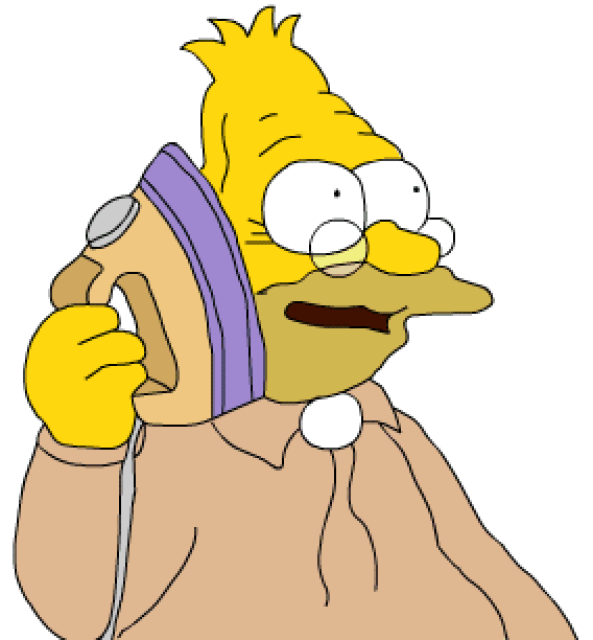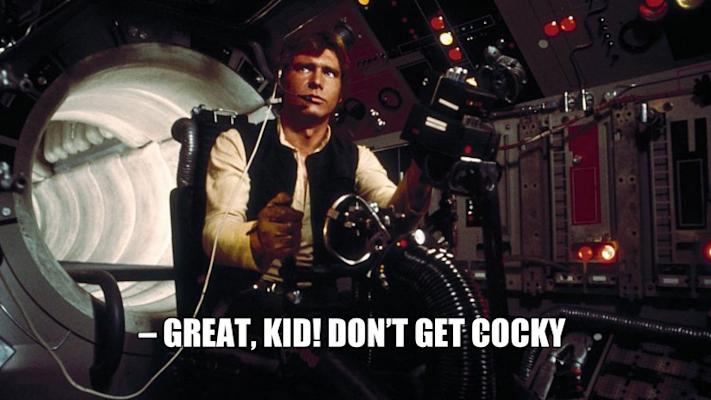
Posted on 02/17/2017 7:57:21 AM PST by RummyChick
Harrison Ford didn't sound like a seasoned pilot of more than 20 years when he stammered through radio calls to the tower ... minutes before his screwed up landing on a taxiway.
TMZ has obtained audio of Harrison's convo with air traffic control as he took off from Santa Monica Airport at 11:49 AM on Feb. 13, and he sounds confused. The SMO tower sends him off with his tail number -- "Husky Niner Hotel Uniform" -- and gives him a personal code (squawk) of 0214 ... his identifying code for air traffic control. All good up to that point.
The trouble starts when Harrison radios back saying he's in a helicopter. He stutters a few times trying to correct his mistake and then throws out his tail number. The bigger problem is he's still talking to SMO tower, which had already turned over to another tower. The controller tells Harrison he's on the wrong frequency, and reminds him he should be communicating with the other tower. Our pilot sources say, on their own, these mistakes would be no big deal. But the FAA might be interested in these because of how his landing went roughly 18 minutes later in Orange County.
Sounds like he’s too old to be flying anymore.
Sounds like they need to keep the old dear out of the cockpit.
the aircraft type was Husky — Aviat Husky. Call sounds correct.
Hoss
His decision should be easy at this point. His flying days as pilot in command may be over, but once he hires an experienced pilot permanently, for any and all future flights, he can fly in the right seat all he wants.
Beats Southern California traffic...
Husky is the aircraft model he was flying. It’s like saying “Baron Niner November Sierra” or “Piper One Two Able.”
Bingo.
I love visiting the Lyon Air Museum at John Wayne Int’l when I’m in OC. A great bunch of vets and old timers there. Lots of great stories.
Lighten up, amok.
Sounding like a hysterical know-it-all and making absolute statements displays a state of mind that is scary. I hope you're not a pilot.
I was prescribed aspirin for a few years. I seriously doubt that qualifies, with or without exclamation points. Nor can it be the only one.
I'm not a pilot, and know nothing about tail number protocol, but could that "Husky" be a mistake regarding audio and who is listening? Could it possibly have been "Whiskey"?
Never mind. I see it's been cleared up in subsequent posts. It's the aircraft type...
I should have read further before asking.
Seems to me with an instructor you would be good for either seat.
No big deal? Telling ATC that you're in a HELICOPTER, when you're piloting a small, single engine fixed-wing?
And he then lands on a taxiway?
I have no axe to grind with Harrison Ford, but it's pretty clear to me that he doesn't belong in the left seat of any aircraft at this point.
It'll be interesting to see if he gets the predictable 'star treatment' on this...
Aspirin is Ok most of the time, Sudafed used to be BANNED but was changed to acceptable 15 years or so ago.
Like I said, MOST Drugs regardless of Legality are Prohibited while Flying,
And Yes I am an IFR rated Pilot for 30 years
FAA Policy
The Federal Aviation Regulations include no specific references to medication usage. FAR 61.53 prohibits acting as pilot-in-command or in any other capacity as a required pilot flight crewmember, while that person:
Knows or has reason to know of any medical condition that would make the person unable to meet the requirement for the medical certificate necessary for the pilot operation, or:
Is taking medication or receiving other treatment for a medical condition that results in the person being unable to meet the requirements for the medical certificate necessary for the pilot operation.
Further, FAR 91.17 prohibits the use of “any drug that affects the persons faculties in any way contrary to safety.”
The FAA generally disallows certain types of drugs that are continuously used for treatment. These include, but aren’t limited to, anticoagulants, antiviral agents, anxiolytics (anti-anxiety), barbiturates, chemotherapeutic agents, experimental, hypoglycemic, investigational, mood altering, motion sickness, narcotic, sedating, antihistaminic, steroids, or tranquilizers.
However, there is no official FAA “list” of drugs that is available to the public. Because FAR 91.17 doesn’t include the names of the prohibited drugs, there is no requirement that the drugs being taken be made known to the FAA prior to completing an FAA airman medical application and physical examination. There are several thousand controlled prescription drugs currently approved by the U.S. Food and Drug Administration. This doesn’t include OTC (over the counter) drugs. Virtually all drugs have the potential to cause adverse side effects in some people. That’s one reason why so many medications carry the generic warning to avoid operating heavy machinery or motor vehicles while using the drug. These warnings pose obviously greater significance for flying. While some individuals experience no side effects with a particular drug, others may be noticeably affected. Since each person’s response is different, the FAA has to consider the worst possible reaction to a drug in evaluating the decision to allow flight duties.
Risks of medication usage
Drugs that cause no apparent side effects on the ground can create serious problems with only moderate increases in altitude. Even for general aviation pilots flying at relatively low altitudes, the changes in concentrations of atmospheric gases, including oxygen and nitrogen, in the blood can enhance the effects of seemingly innocuous drugs and result in impaired judgment, decision-making, and performance.
Remember, too, that medication usage is part of a two-sided coin. Medications are prescribed to treat a medical condition and the condition itself may be considered disqualifying with or without medication usage.
Some of the most commonly used OTC drugs, antihistamines and decongestants, have the potential to cause some of the most noticeable side effects and may well be disqualifying as a result. The symptoms associated with common upper respiratory infections, even a bad cold, will usually suppress a pilot’s desire to fly, and treating symptoms with a drug that causes side effects only compounds the problem. Allegra (fexofenadine), Claritin (loratidine) and Hismanol (astemizole) are noted to be non-sedating and are allowed by the FAA, even though you still might not be legal under FAR 61.53. Remember, a bad head cold may be a “medical deficiency” under the regulations.
For other pulmonary conditions such as asthma, the FAA approves the use of inhalers, including Proventil, Azmacort, Becanase, or Vancenase, on a case-by-case basis, based on a review of the history of symptoms.
Many antihypertensive and cardiac drugs may also be allowed, case-by-case. For blood pressure control, five categories of medications are acceptable: angiotensin converting enzyme inhibitors (ACE) inhibitors, beta adrenergic blocking agents, calcium channel blockers, alpha-adrenergic blocking agents, and diuretics encompass about 60 different acceptable medications. Other cardiac drugs, such as antiarrhythmics, may also be approved, based on the condition for which the medications are prescribed. Agents used to control angina (chest pain) called nitrates, including nitroglycerine, are not permitted.
Any drug that produces drowsiness or other central nervous system effects and experimental or investigational drugs are prohibited. These medications include narcotic analgesics, stimulants, sedatives, hypnotics, amphetamines, barbiturates, anti-anxiety drugs, muscle relaxants, tranquilizers, and antipsychotics (neuroleptics). Among the drugs classified as stimulants is Ritalin, which is used to treat attention deficit disorder (ADD). Lithium carbonate, used to treat certain types of depressive disorders, may be allowed after careful case evaluation.
All antidepressants, including the newer generation of selective serotonin reuptake inhibiting (SSRI) medications, such as Paxil, Prozac, Effexor, Celexa, and Zoloft, are currently disqualifying, regardless of the reason for their use. These medications are often prescribed for “off label” use, that is, they are treating symptoms other than those for which the Food and Drug Administration approved the medication. Again, the underlying symptoms and diagnosis may be disqualifying, and the use of an antidepressant medication compounds the situation.
Anticonvulsants, including phenytoin (Dilantin) and carbamazepine (Tegretol) are disqualifying because of the specific medical history that may include a prior seizure, seizure-like event, or risk of seizure. Although these drugs minimize the possibility of a seizure recurrence, their usage does not absolutely preclude another event.
AOPA’s medication database
Find out the FAA’s position on medications in this database compiled by the AOPA Pilot Information Center. The status of some medications changes from time to time so check back periodically. The database information is verified with the FAA Aerospace Medical Certification Division in Oklahoma City.
If you do not see a particular medication in the database, please call the AOPA Pilot Information Center, 800/USA-AOPA (872-2672), and speak with one of the medical certification specialists . For a more in-depth review of your medical records, consider enrolling in AOPA’s Pilot Protection Services program.

They should do a drug test on him. Wonder if that distant far away look is cannabis induced.
Omg, Leni, he is still flying! At least he had a copilot yesterday.
http://www.dailymail.co.uk/news/article-4232078/Harrison-Ford-completely-misjudged-runway.html
Oh baloney. Love these dementia diagnosis from the peanut gallery. I guess every 40 year old who calls a kid by the wrong name, forgets an appointment, or leaves the coffee on top of their car must now have “dementia”.
What it most likely is, is someone very experienced who made a mistake through excess familiarity. He will get a medical review, a short suspension, some mandatory training time and another check ride. That’s it.
“convo”
I hate hipster abbreviations. “Spox” is another one.
Is it really too time consuming to spell out the whole word?
And yeah, Harrison Ford needs to park it. He’s obviously losing his piloting skills.
Sorry but you are wrong, - “Husky Niner Hotel Uniform” —
Husky is the aircraft manufacturer, Niner Hotel Uniform is part of his N number: 9HU
Disclaimer: Opinions posted on Free Republic are those of the individual posters and do not necessarily represent the opinion of Free Republic or its management. All materials posted herein are protected by copyright law and the exemption for fair use of copyrighted works.